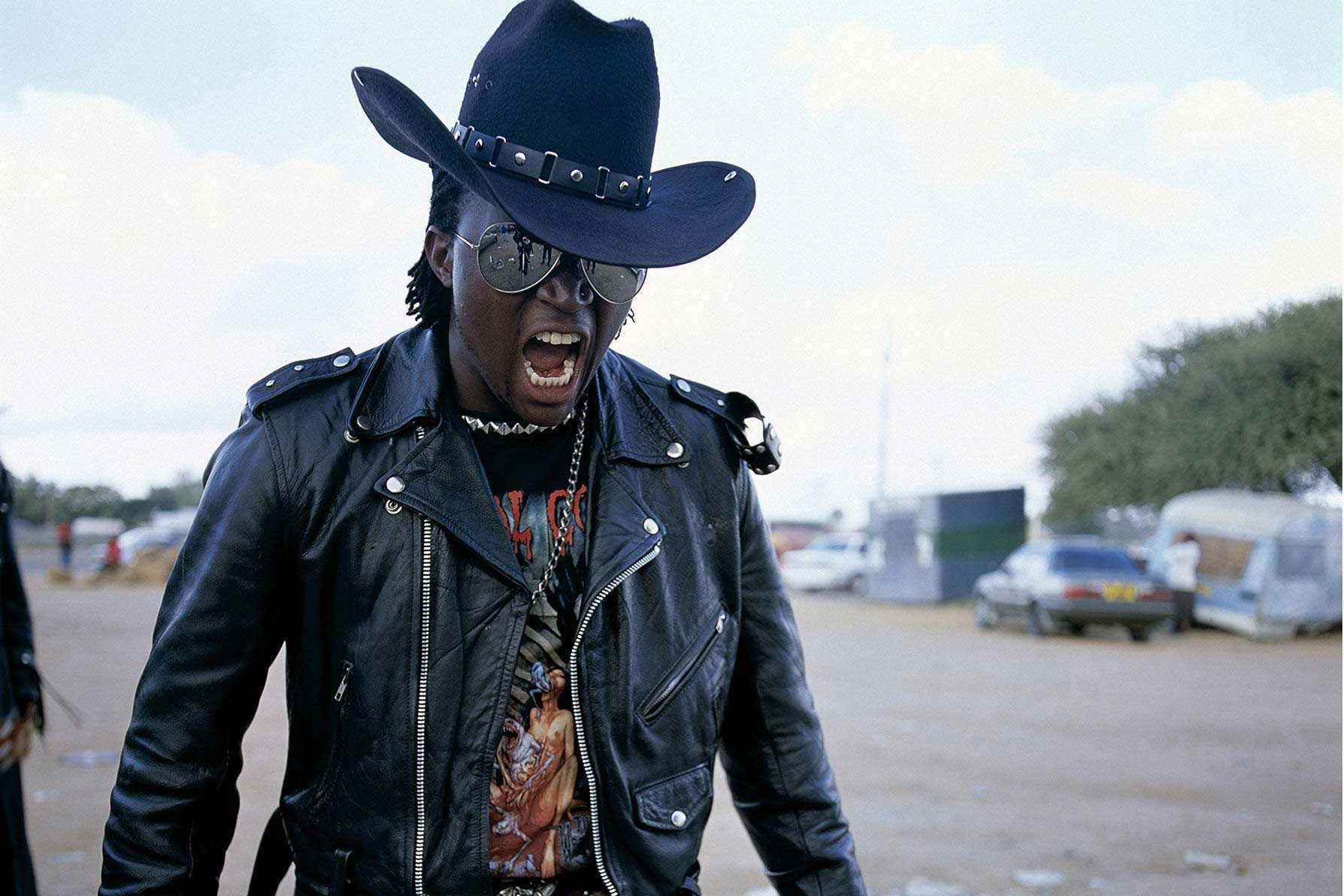http://www.factmag.com/2016/01/28/black-death-africa-heavy-metal/
By S.H. Fernando Jr. | Jan 28 2016
Black Death
How Africa Became Heavy Metal’s New Frontier

Bombed-out buildings offer reminders of conflicts in the recent past. Children play in a sunwashed landscape as a mine clearing team go about their dangerous work. The opening shots of Jeremy Xido’s engaging film Death Metal Angola (2013) paint an image that, at first, seems familiar. “Angola: colonialism, slavery, war for independence, civil war,” says Wilker Flores in the voiceover, summing up the country’s last 500 years.
When we see Flores outside a building shrouded in darkness, he is strumming power chords on a beat-up electric guitar plugged into a small amp. Singing, or rather growling in the distinctive, guttural style of death metal, he cuts the figure of a latter-day electric Leadbelly, exorcising his demons in the night. Death Metal Angola documents his efforts to galvanize the explosion of homegrown talent, organizing the country’s first death metal festival in the town of Huambo, where his girlfriend runs an orphanage. But Angola is no isolated case.
With the internet and social media facilitating the spread of culture globally, various strains of metal, especially the more extreme death metal, have found fertile ground all over Africa, from the former Portuguese colonies of Angola and Mozambique (a nascent scene documented in the forthcoming film Terra Pesada, directed by Leslie Bornstein) to the English-speaking countries of South Africa, Botswana, Zimbabwe, Zambia and Tanzania. Even the East African nations of Kenya and Uganda boast burgeoning metal scenes.
Despite attracting die-hard fans worldwide, metal has never been taken seriously by the mainstream, caricatured in films like This is Spinal Tap and ridiculed as the expression of suburban teenage angst à la Beavis and Butthead. Comedian Richard Pryor skewered the genre in a 1977 skit, taking the stage looking like a member of KISS as the frontman of an imaginary outfit known as Black Death. In an ironic twist, a real band from Cleveland, Ohio, assumed that name a year later, becoming the first African-American heavy metal band, though they have been relegated to history as a novelty act. However, what is going on in Africa today is no novelty.
By S.H. Fernando Jr. | Jan 28 2016
Black Death
How Africa Became Heavy Metal’s New Frontier

Bombed-out buildings offer reminders of conflicts in the recent past. Children play in a sunwashed landscape as a mine clearing team go about their dangerous work. The opening shots of Jeremy Xido’s engaging film Death Metal Angola (2013) paint an image that, at first, seems familiar. “Angola: colonialism, slavery, war for independence, civil war,” says Wilker Flores in the voiceover, summing up the country’s last 500 years.
When we see Flores outside a building shrouded in darkness, he is strumming power chords on a beat-up electric guitar plugged into a small amp. Singing, or rather growling in the distinctive, guttural style of death metal, he cuts the figure of a latter-day electric Leadbelly, exorcising his demons in the night. Death Metal Angola documents his efforts to galvanize the explosion of homegrown talent, organizing the country’s first death metal festival in the town of Huambo, where his girlfriend runs an orphanage. But Angola is no isolated case.
With the internet and social media facilitating the spread of culture globally, various strains of metal, especially the more extreme death metal, have found fertile ground all over Africa, from the former Portuguese colonies of Angola and Mozambique (a nascent scene documented in the forthcoming film Terra Pesada, directed by Leslie Bornstein) to the English-speaking countries of South Africa, Botswana, Zimbabwe, Zambia and Tanzania. Even the East African nations of Kenya and Uganda boast burgeoning metal scenes.
Despite attracting die-hard fans worldwide, metal has never been taken seriously by the mainstream, caricatured in films like This is Spinal Tap and ridiculed as the expression of suburban teenage angst à la Beavis and Butthead. Comedian Richard Pryor skewered the genre in a 1977 skit, taking the stage looking like a member of KISS as the frontman of an imaginary outfit known as Black Death. In an ironic twist, a real band from Cleveland, Ohio, assumed that name a year later, becoming the first African-American heavy metal band, though they have been relegated to history as a novelty act. However, what is going on in Africa today is no novelty.






